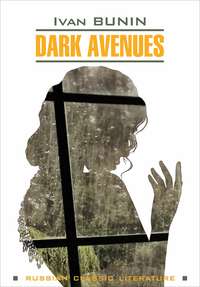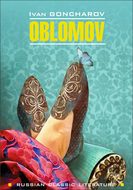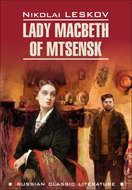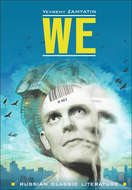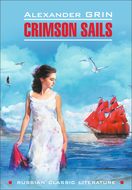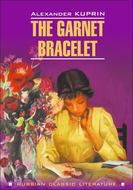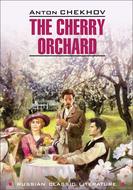Kitabı oku: «Dark Avenues / Темные аллеи. Книга для чтения на английском языке», sayfa 2
A Ballad
On the eve of the big winter holidays the country house was always heated up like a bathhouse and presented a strange picture, for it consisted of spacious and low rooms, the doors of which were all wide open throughout – from the entrance hall to the divan room, situated at the very end of the house – and its red corners20 gleamed with wax candles and lamps in front of the icons.
On the eve of those holidays, they washed the smooth oak floors – which soon dried out from the heating – everywhere in the house, and then carpeted them with clean rugs; they set out in their places in the very best order the furnishings that had been moved aside for the period of work, and in the corners, in front of the gilded and silver settings of the icons, they lit the lamps and the candles and extinguished all other lights. By this time the winter night was already darkly blue outside the windows and everyone dispersed to their own sleeping quarters. Complete quiet was then established in the house, a peace that was reverential and seemingly waiting for something, and which could not have been more in keeping with the sacred nocturnal appearance of the mournfully and touchingly illumined icons.
In the winter the wandering pilgrim Mashenka was sometimes a guest on the estate, grey-haired, withered and tiny, like a little girl. And it was just she alone in all the house who did not sleep on such nights: arriving in the hallway from the servants’ quarters after supper and removing the felt boots21 from her little, woollen-stockinged feet, she would go noiselessly over the soft rugs through all those hot, mysteriously lit rooms, kneel down everywhere, cross herself, bow down before the icons, and then go back to the hallway, sit down on the black chest that had stood in it from time immemorial, and in a low voice recite prayers, psalms, or else simply talk to herself. It was thus I found out one day about this “beast of God, the Lord’s wolf”: I heard Mashenka praying to him.
I could not sleep, and I went out late at night into the reception hall to go through to the divan room and there get something to read from the bookcases. Mashenka did not hear me. She was sitting saying something in the dark hallway. Pausing, I listened closely. She was reciting psalms from memory.
“Hear my prayer, O Lord, and give ear unto my cry,” she said, without any expression. “Hold not thy peace at my tears, for I am a stranger with thee, and a sojourner on the earth, like all my fathers were…22
“Say unto God: how terrible art thou in thy works!23
“He that dwelleth in the secret place of the most High shall abide under the shadow of the Almighty… Thou shalt tread upon the lion and adder, the young lion and the dragon shalt thou trample under foot…”24
At the last words she quietly but firmly raised her voice and pronounced them with conviction: trample upon the lion and the dragon. Then she paused and, after slowly sighing, spoke thus, as if conversing with somebody:
“For every beast of the forest is his, and the cattle upon a thousand hills…”25
I peeped into the hallway: she was sitting on the chest with her little, woollen-stockinged feet hanging down from it evenly and holding her arms crossed at her breast. She was looking straight ahead, not seeing me. Then she raised her eyes to the ceiling and uttered distinctly:
“And thou, beast of God, the Lord’s wolf, pray for us to the Queen of Heaven.”
I approached and said softly:
“Mashenka, don’t be afraid, it’s me.”
She let her arms drop, stood up, gave a low bow:
“Hello, sir. No, sir, I’m not afraid. What have I got to be afraid of now? It was in my youth I was silly, afraid of everything. The dark-eyed demon troubled me.”
“Please sit down,” I said.
“No, sir,” she replied. “I’ll stand, sir.”
I put my hand on her bony little shoulder with its big collarbone, made her sit down, and then sat down next to her:
“Sit still, or else I’ll leave. Tell me, who was it you were praying to? Is there really such a holy one – the Lord’s wolf?”
Again she tried to get up. Again I restrained her:
“Ah, just look at you! And there you are, saying you’re not afraid of anything! I’m asking you: is it true that there’s such a holy one?”
She had a think. Then she replied seriously:
“There must be, sir. There is the beast Tiger-Euphrates,26 after all. And if it’s painted in a church, there must be. I saw it myself, sir.”
“How do you mean, you saw it? Where? When?”
“Long ago, sir, in a time beyond memory. And where – I can’t even say: I remember one thing – we were travelling there three days. There was a village there, Krutiye Gory. I’m from far away myself – perhaps you’re so good as to have heard of the place: Ryazan – and those parts would be even further down, beyond the Don, and what a rough place it is there, you couldn’t even find the words. It was there our prince had his main village, his grandfather’s favourite – maybe a full thousand clay huts on bare mounds and slopes, and on the very highest hill, on its crown, above the Kamennaya River, the masters’ house, all bare too, three-tiered, and a yellow church with columns, and in that church this here God’s wolf: in the middle, then, there’s a cast-iron slab over the tomb of the prince it slaughtered, and on the right-hand pillar – the creature itself, this wolf, painted at its full height and size: it sits in a grey fur coat on a thick tail, and its whole body’s reaching up, with its front paws resting on the ground – and its eyes just boring into yours: a grey fur collar, long-haired and thick, a large head, sharp-eared, its fangs bared, furious, bloodshot eyes, and around its head a gold aureole, like saints and holy men have. It’s terrible just remembering such a wondrous marvel! It’s so lifelike sitting there, looking as if it’ll rush upon you at any moment!”
“Wait, Mashenka,” I said, “I don’t understand a thing: who painted this terrible wolf in the church and why? You say it slaughtered a prince – so then why is it holy, and why should it be over the prince’s tomb? And how did you find yourself there, in that dreadful village? Tell me everything clearly.”
And Mashenka began telling her story:
“I found myself there, sir, for the reason that I was then a serf girl, serving in our prince’s house. I was an orphan, my father, so they had it, was some sort of man passing through – a runaway, most likely – he seduced my mother unlawfully and disappeared God knows where, and mother, soon after giving birth to me, she passed away. Well, so the master took pity on me, took me from the menials into the house as soon as I hit thirteen, and put me at the beck and call27 of the young mistress, and for some reason I so took her fancy she wouldn’t let me out of her favour for any time at all. And it was she that took me on the voyage with her when the young prince got the idea of taking a trip with her to his grandfather’s legacy, to that there main village, to Krutiye Gory. That estate had been long neglected, deserted – the house had just stood boarded up, desolate, ever since the grandfather’s death – well, and our young master and mistress thought they’d like to visit it. But what a terrible death the grandfather had died, we all knew about that from legend…”
In the reception hall something gave a slight crack, then fell with a little thud. Mashenka threw her legs down from the chest and ran into the hall: there was already a smell of burning there from the fallen candle. She put out the still-smoking candlewick, stamped out the smouldering that had started on the nap of a rug and, jumping up onto a chair, relit the candle from the other burning candles stuck into silver sockets beneath the icon, and fitted it into the one from which it had fallen: she turned the bright flame downwards, dripped the wax, which ran like hot honey, into the socket, then inserted it; deftly, with slender figures, she removed the burnt deposit from the other candles, and jumped back down onto the floor.
“My, how cheerfully it’s started gleaming,” she said, crossing herself and gazing at the revived gold of the candle lights. “And what a smell of the church there is now!”
There was the smell of sweet fumes, the little lights trembled, from behind them the ancient face of the icon gazed from a blank circle in its silver setting. In the upper, clear panes of the windows, which were frosted over at the bottom with thick, grey rime, the night was black, and white nearby in the front garden were the ends of boughs burdened with layers of snow. Mashenka looked at them too, crossed herself once more and came back into the hallway.
“It’s time for you to sleep, sir,” she said, sitting down on the chest and stifling her yawns, covering her mouth with her withered little hand. “The night’s grown menacing now.”
“Why menacing?”
“Because it’s mysterious, when only the chanticleer, the cockerel, as we call it, and the night crow, the owl, can stay awake. Then the Lord Himself listens to the earth, the most important stars begin to twinkle, the ice holes freeze in seas and rivers.”
“And why is it you yourself don’t sleep at night?”
“I sleep as much as is needed as well, sir. Is an old person meant to have a lot of sleep? Like a bird on a branch.”
“Well, go to bed, only finish telling me about that wolf.”
“But you know, it’s a dark business, long ago, sir – perhaps a ballad.”
“What’s that you said?”
“A ballad, sir. That’s what all our masters used to say, they liked reading those ballads. Sometimes I’d be listening and there’d be a tingling on my head:
Howls the cold wind o’er the mountain,
Whirls in white the pasture,
Comes foul weather and the blizzard,
Buried deep’s the highway28
“How beautiful, Lord!”
“What’s beautiful about it, Mashenka?”
“What’s beautiful about it, sir, is you don’t know what it is that’s beautiful. It’s scary.”
“In the old days, Mashenka, everything was scary.”
“How can I put it, sir? Perhaps it’s true that it was scary, but it all seems dear to me now. I mean, when was it? Just so long ago – all the kingdoms have gone, all the oaks have crumbled from old age, all the graves are level with the earth. Now this story too – among the menials it used to be told word for word, but is it the truth? The story was supposed to have happened still in the time of the great Tsarina,29 and the reason why the prince was sitting in Krutiye Gory was supposed to be that she’d grown angry with him over something, had shut him up a long way away from her, and he’d become really fierce – most of all in the punishment of his serfs and in fornication. He was still very much in his prime, and as for his appearance, wonderfully handsome, and both among his menials and throughout his villages there wasn’t supposed to be a single girl he hadn’t demanded come to him, to his seraglio, for her wedding night. So he went and fell into the most terrible sin: he was even tempted by his own son’s new bride. The son was in St Petersburg in the military service of the Tsarina, and when he’d found himself his intended, he got permission for the marriage from his father and married, and so then he came with his new bride to pay his respects to him, to that there Krutiye Gory. And the father goes and falls for her30. Not for nothing31, sir, is it sung about love:
And however can it be a sin, when even an old man’s thinking about his beloved, sighing over her? But here, after all, it was a completely different matter, here it was like it was his own daughter, and he’d stretched his grasping intentions to fornication.”
“And so what happened?”
“Well, sir, the young prince, remarking this parental design, decided to flee in secret. He put the stablemen up to it, gave them all sorts of presents, ordered them to harness up a good quick troika for midnight, stole out from his own family home as soon as the old prince had fallen asleep, led out his young wife – and he was off. Only the old prince wasn’t even thinking of sleeping: he’d already found everything out that evening from his informers and straight away gave chase. Night-time, an unspeakable frost, so there’s even rings lying round the moon, snows in the steppe deeper than the height of a man, but it’s all nothing to him: he flies along on his steed, sabres and pistols hanging all over him, beside his favourite whipper-in, and already he can see the troika with his son up ahead. He cries out like an eagle: stop, or I’ll shoot! But they don’t pay any heed33 there, they drive the troika on at full blazing speed. Then the old prince began shooting at the horses, and killed as he rode first the one outrunner, the right-hand one, as it ran, then the other, the left-hand one, and already he meant to lay low the shaft horse, but he glanced to the side and sees rushing at him across the snow, beneath the moon, a great, fantastic wolf with eyes red like fire and with an aureole around its head! The prince set about firing at it too, but it didn’t even bat an eyelid34: rushed at the prince like a whirlwind, jumped onto his chest – and in a single instant slashed through his Adam’s apple35 with its fang.”
“Ah, what horrors, Mashenka,” I said. “Truly, a ballad!”
“It’s a sin to mock, sir,” she replied. “God’s world is full of wonders.”
“I don’t disagree, Mashenka. Only it’s strange, nonetheless, that this wolf has been painted right beside the tomb of the prince it slaughtered.”
“It was painted, sir, as the prince himself wished; he was brought home still alive, and he had the time before dying to make his confession and take communion36, and in his final moment he ordered that wolf to be painted in the church above his tomb – as a lesson, then, for all the prince’s descendants. Who could possibly have disobeyed him in those days? And the church was his domestic one too, built by him himself.”
3rd February 1938
Styopa
Just before evening on the road to Chern the young merchant Krasilschikov was caught by a thunderstorm and torrential rain. In a knee-length jacket with raised collar and a peaked cap pulled well down with streams running off it, he was riding quickly in a racing droshky37, sitting astride right up against the dashboard38 with his feet in high boots pressed hard against the front axle, jerking with wet, frozen hands on the wet, slippery, leather reins, hurrying along a horse that was full of life anyway; to his left, beside the front wheel, which spun in a whole fountain of liquid mud, a brown pointer ran steadily with his long tongue hanging out.
At first Krasilschikov drove along the black-earth track beside the highway, then, when it turned into an unbroken grey, bubbling torrent, he turned onto the highway and began crunching over its little broken stones. Neither the surrounding fields nor the sky had been visible for a long time now through this flood, which smelt of the freshness of cucumbers and of phosphorus; before his eyes, like a sign of the end of the world, in blinding ruby fire, a sharp, nakedly branching flash of lightning kept searing sinuously down from above across a great wall of clouds, and with a crack above his head there would fly the sizzling tail, which then exploded in thunderclaps, extraordinary in their shattering power. Each time the horse would jerk its whole body forwards, pressing back its ears, and the dog was already at a gallop… Krasilschikov had grown up and studied in Moscow, had graduated from university there, but in the summer, when he came to his Tula estate, which resembled a rich dacha, he liked to feel himself a landowning merchant of peasant origin, he drank Lafitte39 and smoked from a gold cigarette case, yet wore blacked boots40, a kosovorotka and poddyovka41, and was proud of his Russian character – and now, in the torrential rain and thunder, feeling the coldness of the water pouring from the peak of his cap and his nose, he was full of the energetic pleasure of rural life. This summer he often recalled the summer of the previous year, when, because of a liaison with a well-known actress, he had moped the time away in Moscow right up until July, until her departure for Kislovodsk: idleness, the heat, the hot stench and green smoke from the asphalt glowing in iron vats in the upturned streets, lunches in the Troitsky basement tavern with actors from the Maly Theatre who were preparing to leave for the Caucasus too, then sitting in the Tremblé coffee house, and waiting for her in the evening at his apartment with the furniture under covers, with the chandeliers and pictures in muslin, with the smell of mothballs… The summer evenings in Moscow are unending, it gets dark only towards eleven, and there you are, waiting, waiting – and still she’s not there. Then finally the bell – and it’s her, in all her summer smartness, and her breathless voice: “Please do forgive me, I’ve been flat on my back all day with a headache, your tea rose has completely wilted, I was in such a hurry I took a fast cab, I’m terribly hungry…”
When the torrential rain and the shaking peals of thunder began to die down and move away and it began clearing up all around, up ahead, to the left of the highway, the familiar coaching inn of an old widower, the petty bourgeois Pronin, appeared. There were still twenty kilometres to go to town – I should wait a little, thought Krasilschikov, the horse is all in a lather, and there’s still no knowing what might happen again, look how black it is in that direction, and it’s still lighting up… At the crossing point to the inn he turned at a trot and reined the horse in beside the wooden porch.
“Granddad!” he gave a loud cry. “You’ve got a guest!”
But the windows in the log building under its rusty iron roof were dark, nobody responded to the cry. Krasilschikov wound the reins onto the dashboard, went up onto the porch after the wet and dirty dog which had leapt up onto it – it had a mad look, its eyes shone brightly and senselessly – pushed the cap back from his sweaty forehead, took off his jacket, heavy with water, threw it onto the handrail of the porch, and, remaining in just a poddyovka with a leather belt decorated in silver, he wiped his face, mottled with muddy splashes, and began cleaning the mud from the tops of his boots with his whip handle. The door into the lobby was open, but there was a feeling of the building being empty. Probably bringing in the livestock, he thought, and, straightening up, he looked into the fields: should he drive on? The evening air was still and damp, in different directions in the distance quails were making a cheerful noise in corn crops heavy with moisture, the rain had stopped, but night was coming on, the sky and earth were darkening morosely, and a cloud beyond the highway, behind a low, inky ridge of woodland, was a still more dense and gloomy black, and a red flame was flaring up, widespread and ominous – and Krasilschikov strode into the lobby and groped in the darkness for the door into the living quarters. But they were dark and quiet, only somewhere on a wall was there a one-rouble clock ticking away. He slammed the door, turned to the left, groped for and opened another one, into the rest of the hut: again nobody, in the hot darkness the flies alone began a sleepy and discontented buzzing on the ceiling.
“As if they’d snuffed it!42” he said out loud – and immediately heard the quick and melodious half-childish voice of Styopa, the owner’s daughter, who had slipped down from the plank bed43 in the darkness.
“Is that you, Vasil Lixeyich? I’m here by meself, the cook had a row with Daddy and went home, and Daddy took the workman and went away into town on business, and he’s unlikely to get back today… I was frightened to death by the storm, and then I hear someun’s44 driven up, got even more frightened… Hello, please forgive me…”
Krasilschikov struck a match and illuminated her black eyes and swarthy little face:
“Hello, you little idiot. I’m going into town as well, but you can see what’s happening, I dropped in to wait it out… And so you thought it was robbers that had driven up?”
The match had begun to burn out, but it was still possible to see that little face smiling in embarrassment, the coral necklace on the little neck, the small breasts under the yellow cotton dress. She was hardly more than half his height and seemed just a little girl.
“I’ll light the lamp straight away,” she began hurriedly, made even more embarrassed by Krasilschikov’s penetrating gaze, and rushed to the lamp above the table. “God Himself sent you, what would I have done here alone?” she said melodiously, rising onto tiptoe and awkwardly pulling the glass out of the indented grille of the lamp, out of its tin ring.
Krasilschikov lit another match, gazing at her stretching and curved little figure.
“Wait, don’t bother,” he suddenly said, throwing the match away, and took her by the waist. “Hang on, just turn around to me for a minute…”
She glanced at him over her shoulder in terror, dropped her arms and turned around. He drew her towards him – she did not try to break away, only threw her head back wildly in surprise. From above, he looked directly and firmly into her eyes through the twilight and laughed:
“Got even more frightened?”
“Vasil Lixeyich…” she mumbled imploringly, and pulled herself out of his arms.
“Wait. Don’t you like me, then? I mean, I know you’re always pleased when I drop in.”
“There’s no one on earth better than you,” she pronounced quietly and ardently.
“Well, you see…”
He gave her a long kiss on the lips, and his hands slid lower down.
“Vasil Lixeyich… for Christ’s sake… You’ve forgotten, your horse is still where it was by the porch… Daddy will be coming… Oh, don’t!”
Half an hour later he went out of the hut, led the horse off into the yard, stood it underneath an awning, took the bridle off, gave it some wet, mown grass from a cart standing in the middle of the yard, and returned, gazing at the tranquil stars in the clear sky. Weak, distant flashes of summer lightning were still glancing from different directions into the hot darkness of the quiet hut. She lay on the plank bed all coiled up, her head buried in her breast, having cried her fill of hot tears from horror, rapture and the suddenness of what had happened. He kissed her cheek, wet and salty with tears, lay down on his back and placed her head on his shoulder, holding a cigarette in his right hand. She lay quiet, silent, and with his left hand, as he smoked, he gently and absent-mindedly stroked her hair, which was tickling his chin… Then she immediately fell asleep. He lay gazing into the darkness, and grinned in self-satisfaction: “Daddy went away into town…” So much for going away! It’s not good, he’ll understand everything at once – such a dried-up and quick little old man in a little grey poddyovka, a snow-white beard, but whose thick eyebrows are still completely black, an extraordinarily lively gaze, talks incessantly when drunk, but sees straight through everything.
He lay sleepless until the time when the darkness of the hut began to lighten weakly in the middle, between the ceiling and the floor. Turning his head, he saw the east whitening with a greenish tinge outside the windows, and in the twilight of the corner above the table he could already make out a large icon of a holy man in ecclesiastical vestments45, with his hand raised in blessing and an inexorably dread gaze. He looked at her: she still lay curled up in the same way, her legs drawn up, everything forgotten in sleep! A sweet and pitiful little girl.
When it became fully light in the hut, and a cockerel began yelling in various different voices on the other side of the wall, he made a move to rise. She leapt up and, half-seated, sideways on, unbuttoned at the breast and with tangled hair, she stared at him with eyes that understood nothing.
“Styopa,” he said cautiously. “It’s time I was off.”
“You’re going already?” she whispered senselessly.
And suddenly she came to and, arms crossed, struck herself on the breast with her hands:
“And where are you going? How will I get along without you now? What am I to do now?”
“Styopa, I’ll come back again soon…”
“But Daddy will be at home, won’t he? – how ever will I see you? I’d come to the wood on the other side of the highway, but how can I get out of the house?”
Clenching his teeth, he toppled her onto her back. She threw her arms out wide and exclaimed in sweet despair, as though about to die: “Ah!”
Afterwards he stood before the plank bed, already wearing his poddyovka and his cap, with his knout in his hand and with his back to the windows, to the dense lustre of the sun, which had just appeared, while she knelt on the bed and, sobbing and opening her mouth wide in a childish and unattractive way, articulated jerkily:
“Vasil Lixeyich… for Christ’s sake… for the sake of the King of Heaven Himself, take me in marriage! I’ll be your very meanest slave! I’ll sleep by your doorstep – take me! I’d leave and come to you as I am, but who’ll let me do it like this! Vasil Lixeyich…”
“Be quiet,” Krasilschikov said sternly. “In a few days’ time I’ll come and see your father and tell him I’m marrying you. Do you hear?”
She sat down on her legs, breaking off her sobbing immediately, and obtusely opened wide her wet, radiant eyes:
“Is that true?”
“Of course it’s true.”
“I already turned sixteen at Epiphany46,” she said hurriedly.
“Well then, so in six months’ time you can get married too…”
On returning home, he began preparations at once, and towards evening left for the railway in a troika. Two days later he was already in Kislovodsk.
5th October 1938
